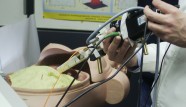Novel 3D Endoscopy and Gesture Control Camera

The camera is a novel Time-of-Flight camera, similar to the currently announced Kinect sensor in the XBox One, to be used in medical applications like endoscopy surgeries and gesture control. The camera is being developed by the 3-D Imaging in Medicine German Research and Development cluster.
Minimally invasive operations have become very common. They are an important group of surgical techniques, which use a minimal incisions in the exposed skin to penetrate into the surgery domain using a cannula equipped with a camera, or a minuscule surgical tool. These surgeries are performed for a wide variety of indications owing to their significant advantages including the shorter recovery period. They also require high motoric capabilities and supreme hand eye coordination. Surgeons occasionally face complex technical difficulties. One of the most important aspects of minimally invasive surgeries, arising from their advantage, is the complete dependence on the camera which becomes the surgeon eye during the operation. The cluster partners are currently working towards a prototype of such a Time-of-Flight based endoscope.
According to Dr. Kurt Höller, managing director of the ZiMT, surgeons face additional difficulties during minimally invasive surgeries. “There is some difficulty in horizontal orientation when using a flexible cannula (a flexible endoscope),” said Dr. Höller. “We have developed a sensor which, when mounted on the far end of the endoscope, provides a horizontal balanced image.” According to Dr. Höller, this technology has not yet been used in medicine, “but we have conducted important researches in animal inspecting this technology prior to putting it into future clinical application,” he added.
Dr. Höller indicates that the combination of all these different technologies will bring about significant improvement in the surgeon capacities to perform both complex and simple procedures and minimally invasive surgeries. Dr. Höller sees much importance in the international collaboration in this domain and he adds that the German delegation visits Israel to introduce this innovative development and to establish collaboration with Israeli companies and organisations.
Another very important topic investigated by the cluster partners is the controlling of medical devices within a sterile environment. The Central Institute for Medical Technology (ZiMT) at the Friedrich Alexander University in Erlangen, Bavaria and member of the 3-D Imaging in Medicine cluster, will present a prototype of a gesture control for operation rooms at the 2013 BioMed week. Using this new camera and the software developed by a company called Metrilus, the doctor has the ability to control medical devices during surgery more easily and safely.

